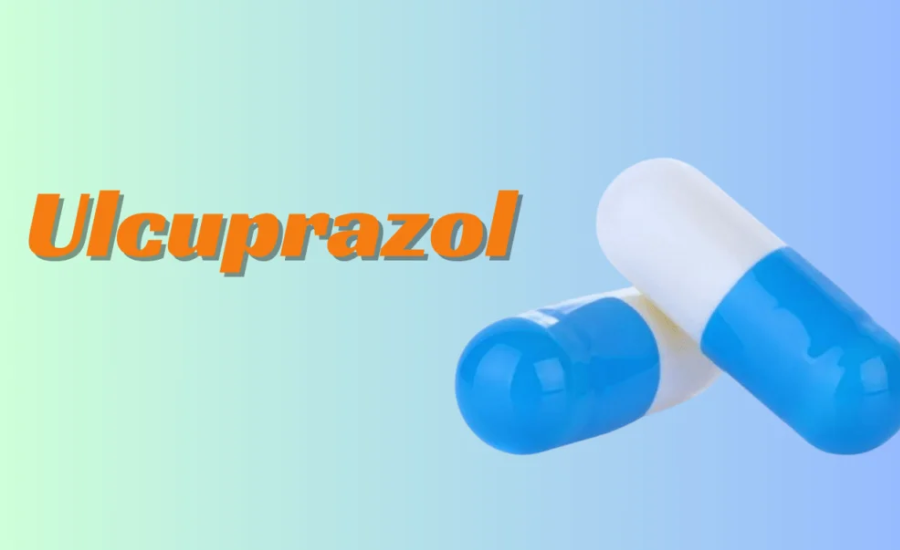Ulcuprazol is a widely used medication designed to manage a variety of gastrointestinal (GI) issues that arise from the excessive production of stomach acid. Classified as a proton pump inhibitor (PPI), it plays a pivotal role in treating conditions like gastroesophageal reflux disease (GERD), peptic ulcers, Zollinger-Ellison syndrome, and more. PPIs like Ulcuprazol are essential tools in modern medicine, providing long-term management options for chronic acid-related conditions and reducing the risk of complications associated with these diseases. This article explores Ulcuprazol’s therapeutic profile in detail, covering its mechanism of action, benefits, recommended dosages, possible side effects, drug interactions, precautions, and alternative treatments.
What Is Ulcuprazol?

Ulcuprazol is the brand name for a pharmaceutical formulation containing the active ingredient Omeprazole. As a proton pump inhibitor, Ulcuprazol specifically targets and reduces gastric acid production, making it useful for a broad range of acid-related conditions. Available in various forms, including tablets, capsules, and oral suspensions, it offers flexible administration options to accommodate different patient needs.
Mechanism of Action: How Ulcuprazol Works
To understand Ulcuprazol’s therapeutic effects, it’s important to understand its mechanism of action, which involves inhibiting the secretion of gastric acid in the stomach. The stomach lining contains specialized cells called parietal cells, responsible for producing hydrochloric acid (HCl). These cells utilize an enzyme known as hydrogen-potassium ATPase—often referred to as the “proton pump”—to generate the necessary acidic environment that aids in digestion. This enzyme is integral to the final stage of acid production in the stomach.
Upon ingestion, Ulcuprazol’s active component, Omeprazole, binds to and inhibits the proton pump within the parietal cells, significantly reducing the production of gastric acid. By blocking this enzyme, Ulcuprazol prevents the formation of excess stomach acid, thereby relieving symptoms such as heartburn, acid reflux, and indigestion. This process is not immediate, however; the medication reaches its maximum efficacy within 24 to 48 hours after administration, making it a suitable option for ongoing, long-term management rather than immediate symptom relief.
Key Medical Uses of Ulcuprazol

Ulcuprazol is prescribed to manage various gastrointestinal disorders. Below are the primary therapeutic applications:
1. Gastroesophageal Reflux Disease (GERD)
By reducing acid production, Ulcuprazol alleviates these symptoms, promoting healing and providing relief from the burning sensation often associated with acid reflux.
2. Peptic Ulcers
Ulcuprazol helps reduce this acid, creating an environment conducive to healing and minimizing further irritation to the stomach lining. This is especially helpful in preventing complications such as bleeding or perforation of the ulcer.
3. Zollinger-Ellison Syndrome
Zollinger-Ellison syndrome is a rare condition in which gastrin-secreting tumors (gastrinomas) cause an overproduction of stomach acid, leading to recurrent ulcers and severe gastrointestinal complications. Ulcuprazol is an important part of the treatment plan for patients with this syndrome, as it helps manage and reduce acid levels, decreasing the likelihood of further damage and discomfort.
4. Helicobacter pylori (H. pylori) Infection
H. pylori is a bacterium that can infect the stomach lining, contributing to the development of peptic ulcers and potentially leading to gastritis. Ulcuprazol is often used in combination with antibiotics to eradicate this bacterium, as it helps reduce acid production, enabling the antibiotics to work more effectively and supporting the healing of the stomach lining.
5. Erosive Esophagitis
This condition involves inflammation and damage to the esophagus due to repeated acid exposure. Ulcuprazol can help manage erosive esophagitis by reducing acid levels, which not only relieves associated symptoms like pain and difficulty swallowing but also supports the natural healing process of the esophageal tissue.
6. Prevention of NSAID-Induced Ulcers
Nonsteroidal anti-inflammatory drugs (NSAIDs) are commonly used to manage pain and inflammation, but prolonged use can cause ulcers in the stomach lining.
Benefits of Ulcuprazol

Ulcuprazol provides several significant benefits that contribute to its effectiveness and popularity as a treatment for acid-related disorders:
1. Effective Symptom Relief
Ulcuprazol’s acid-suppressing effect alleviates common symptoms like heartburn, acid reflux, and indigestion, providing significant relief for patients and improving overall quality of life.
2. Promotes Healing of Ulcers and Erosions
By reducing stomach acid, Ulcuprazol facilitates the natural healing of ulcers and erosions in the gastrointestinal tract, allowing damaged tissues to recover and reducing the risk of further complications.
3. Prevention of Serious Complications
If left untreated, acid-related conditions can lead to severe complications, such as bleeding ulcers, strictures, and Barrett’s esophagus, a precancerous state. By controlling acid levels, Ulcuprazol helps prevent these serious outcomes.
4. Long-Term Management of Chronic Conditions
For patients with chronic acid-related conditions like GERD or Zollinger-Ellison syndrome, Ulcuprazol is suitable for long-term use. This helps maintain acid levels within a manageable range, keeping symptoms under control and preventing exacerbations.
5. Flexible Treatment Options
Ulcuprazol can be used alone or in combination with other medications. For example, in the treatment of H. pylori infections, it is often paired with antibiotics to achieve optimal results, illustrating its versatility in comprehensive treatment plans.
Dosage Guidelines and Administration of Ulcuprazol

Proper administration of Ulcuprazol is crucial for achieving optimal results and minimizing potential side effects. Here is an expanded guide on dosage recommendations for various conditions that commonly require acid suppression therapy with Ulcuprazol:
- Gastroesophageal Reflux Disease (GERD) and Erosive Esophagitis
GERD is a chronic condition where stomach acid frequently flows back into the esophagus, leading to discomfort, inflammation, and in severe cases, erosion of the esophageal lining. For patients with GERD and erosive esophagitis, the standard dose of Ulcuprazol is 20 to 40 mg once daily.
- Peptic Ulcers
Peptic ulcers are open sores that form on the lining of the stomach, esophagus, or small intestine due to excess stomach acid and sometimes bacterial infection. For peptic ulcer treatment, the recommended dose of Ulcuprazol is 20 to 40 mg once daily, typically prescribed for 4 to 8 weeks. This dosage allows for adequate acid suppression, creating a less hostile environment in the stomach and duodenum that promotes healing of the ulcerated tissues.
- Zollinger-Ellison Syndrome
Zollinger-Ellison syndrome is a rare but severe condition in which gastrin-secreting tumors cause excessive stomach acid production. Due to the high levels of acid involved, initial treatment for Zollinger-Ellison syndrome requires an initial dose of 60 mg daily of Ulcuprazol. Depending on the patient’s response, the doctor may adjust the dosage upwards, as this condition often necessitates higher doses for effective acid management.
- Helicobacter pylori (H. pylori) Infection
H. pylori is a bacterial infection that can lead to peptic ulcers and chronic gastritis. This dual-therapy approach suppresses stomach acid, creating a less favorable environment for the bacteria and enhancing the effectiveness of the antibiotics. Following the complete course is essential to ensure thorough eradication of the infection and to support ulcer healing.
Importance of Adhering to the Dosing Schedule

Following the recommended dosing schedule enhances Ulcuprazol’s therapeutic effects by ensuring consistent acid suppression, which is especially important in managing chronic conditions like GERD and Zollinger-Ellison syndrome.
Facts
- Classification:
Ulcuprazol contains Omeprazole, a proton pump inhibitor (PPI) used to reduce stomach acid.
- Mechanism of Action:
Ulcuprazol works by inhibiting the hydrogen-potassium ATPase enzyme, commonly known as the proton pump, in stomach cells, which reduces acid production.
- Medical Uses:
It treats gastroesophageal reflux disease (GERD), peptic ulcers, Zollinger-Ellison syndrome, Helicobacter pylori infections, erosive esophagitis, and prevents NSAID-induced ulcers.
- Forms and Administration:
Available as tablets, capsules, and oral suspensions, Ulcuprazol provides flexible options to meet patients’ needs.
- Onset of Relief:
Most patients experience relief within 24 to 48 hours as the medication reaches its peak effectiveness.
- Dosage:
Dosages vary from 10 mg to 60 mg daily based on the condition, with 20-40 mg being common for GERD and peptic ulcers.
- Combination Therapy:
Often combined with antibiotics for H. pylori eradication, it is effective in reducing acid for optimal antibiotic activity.
Frequently Asked Questions (FAQs)
Q: What conditions can Ulcuprazol treat?
A: Ulcuprazol is prescribed for GERD, peptic ulcers, Zollinger-Ellison syndrome, H. pylori infections, erosive esophagitis, and prevention of NSAID-induced ulcers.
Q: How does Ulcuprazol work?
A: It inhibits the proton pump in stomach cells, reducing acid production and alleviating symptoms associated with acid reflux and other acid-related conditions.
Q: How long does it take for Ulcuprazol to start working?
A: Relief typically begins within 24 to 48 hours after starting Ulcuprazol, with full therapeutic effects reached within a few days.
Q: Is Ulcuprazol suitable for long-term use?
A: Yes, it can be used for chronic conditions like GERD, but long-term use should be monitored by a healthcare provider to avoid potential side effects.
Q: Are there any side effects?
A: Common side effects include headache, nausea, diarrhea, and abdominal pain. Rarely, long-term use may increase the risk of bone fractures or vitamin deficiencies.
Q: Can Ulcuprazol be taken with other medications?
A: Yes, Ulcuprazol is often combined with antibiotics for H. pylori treatment, but it may interact with certain drugs, so consulting a healthcare provider is recommended.
Q: When is the best time to take Ulcuprazol?
A: For best results, it is generally recommended to take Ulcuprazol before meals.
Conclusion
Ulcuprazol is a trusted medication in managing acid-related gastrointestinal conditions. By effectively reducing gastric acid production through its proton pump inhibition mechanism, it provides significant relief for patients with GERD, peptic ulcers, and other acid-related disorders. Its versatility in treatment, ability to promote healing, and role in preventing complications make it an invaluable tool in modern medicine. While generally well-tolerated, users should be mindful of potential side effects and interactions. Overall, Ulcuprazol offers a reliable and flexible option for patients seeking long-term management and relief from acid-related symptoms.
Stay tuned in to this: Magazine Released
